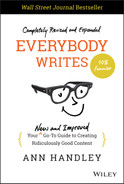28
Avoid Hot Dog Writing
Having a writing partner by your side is helpful.
Having an entire committee on your back? Not so much.
Approval from clients or colleagues isn't a bad thing. It's a fact of life for most of us.
The problem comes when suggestions become unreasonable: when they strip all intent or personality out of a message or piece.
Or when input becomes too heavy-handed.
* * *
Leonardo emailed recently to tell me about his co-worker who had internally floated the draft of an exec's Twitter bio.
(Leonardo isn't his real name. I invited him into my Writer's Witness Protection Program to conceal his identity. Comes with a new passport and Ted Lasso mustache.)
He likes his job, Leonardo said. But the problem is that everything the Marketing team produces is written by the entire group. Everything is written by committee.
The Twitter bio, for example. It should've been straightforward … but nosiree, Ted: The feedback was swift and harsh.
Everyone had an opinion. Everyone scrambled to voice it. “You'd think she was defending a thesis in our team meeting, haha!” he wrote.
Even through email (and his voice distorted to protect his identity) … I felt the pain in his “haha.”
How can we avoid Writing By Committee?
* * *
I call this kind of writing Hot Dog Writing: Extruded through so many Messaging Machines and Opinionators and Cogitators that you can't tell what it was originally made of. (Snouts? Intestines? Who knows?)
If your writing is subject to colleague or client approvals (“The Committee”), here's some advice to make the process useful (and permanently unplug that Hot Dog Messaging Machine):
- Reinforce the Big 3. Make sure The Committee understands the intent, the goal, and (most important!) the reader.
The biggest problems with The Committee often spring from a lack of clarity on the Big 3. That leaves members of The Committee reviewing a piece without context and giving feedback on something they personally like or dislike. (“I don't like that word.”)
- Use your tone of voice guide as your spotter—there to catch you, preventing a total face-plant.
Agreeing on a set of writing and voice guidelines before any work begins will keep everyone on the same page (literally).
You might need to remind The Committee of your guide's specifics, especially if they aren't routinely tumbling on the mat with your brand voice as much as you are.
- Create a monster outline before you start writing. Stuff that outline full. More is better than less.
Include the bones of the piece—but also the heart, lungs, central nervous system: the overall approach. Anecdotes. Stories. Examples. Ideas. Data you'll reference. Experts, influencers you'll quote.
It can be ugly. A real monster. That's okay.
The key organs are there, even if patched together, Frankenstein-style.
- Set clear expectations and a timeline for reviewers. You want to avoid a free-for-all that turns into a week-long Writing-by-Committee Festival. (The most un-fun festival of all time.)
You set the terms: Who reviews what sections? What specifically do you need from each?
For example: The Client or Marketing VP reviews the overall strategy. Legal gets a say in anything touchy related to compliance. Brand weighs in on overall approach. Your subject-matter expert reads through the technicalities of that complex thing you're writing about on page 2. Keep PR in the loop. (Because that's always a good thing to do.)
You let them know the hard deadline when the reviews need to be in: by end-of-day Wednesday, say.
Not New Year's Eve.
No exceptions.
- Seek an okay, not opinions. “Please approve” is likely to deliver far fewer festival-style edits than will “please tell me if you have suggestions.”
- Set expectations for the number of approval rounds. One or two is fine. Five? Get outta town, Gary from Legal.
State it right up front: “Here's the plan, Committee Colleagues …”
- OWN YOUR ROLE. Uppercasing this. It's important: As much as you set expectations for others … communicate your own role in the review process, too.
You might say: “I'll take your comments and incorporate them according to our tone-of-voice guidelines and strategy for this piece.”
(But maybe with a bit more warmth and good humor. That sentence sounds like I'm the stressed-out event planner trying to arrange enough boxed lunches for that Writing-By-Committee Festival. You can do better.)
Doing so reinforces your expertise. It also fortifies the role of you—the brave and heroic writer (also good-looking)—as the ultimate owner of the piece.
After all: It's YOUR bottom on the line!
It also kicks to the curb any arguments over specific word choice or phrasing.
Which for most of us is the most painful and heartbreaking part of Hot Dog Writing.
